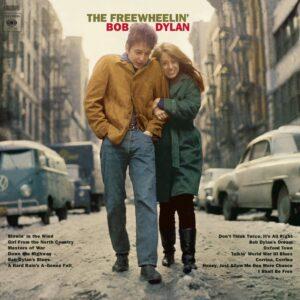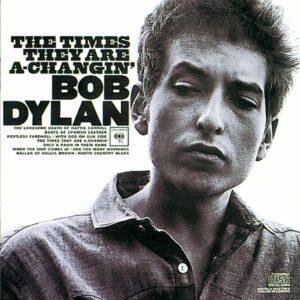Bob Dylan Protest Songs
Through his songs, Bob Dylan has always been a voice of resistance and justice. Since the 1960s, his songs have resonated with generations, and he is widely regarded as one of the most influential people in modern American society. Throughout his career, Dylan has used compelling words and excellent melodies to address contentious issues such as civil rights, war, persecution, and injustice. This article will examine some of Bob Dylan's most famous protest songs and how they still inspire us today.
Bob Dylan's portfolio of work — from “Blowin' in the Wind” to “The Times They Are A-Changin'” — has served as a lasting soundtrack for social change movements throughout history. Dylan utilized his position to push people to stand up to repressive forces, from anti-war statements to demands for civil rights awareness. His words were so moving that Martin Luther King Jr. referenced one of his songs at a speech in 1963!
Dylan is more than simply an icon; he is an eternal source of inspiration for activists throughout the world working for a better future for all humanity. We may understand why some of his best-known protest songs are still relevant today, long after their initial release date, by reviewing some of his most well-known protest songs. We may utilize the same principles learned decades ago while advocating for good change now by understanding what made them so effective.
Blowin' In The Wind
“Blowin' in the Wind,” Bob Dylan's legendary protest song, has become a potent symbol of resistance and optimism. It reflects the spirit of people fighting injustice while remaining hopeful that their efforts will be rewarded in the end. The lyrics raise important issues about freedom, justice, and peace, all of which resonate with audiences today.
The basic melody is simple to learn, making it ideal for group singing at demonstrations and protests. This uniting impact contributes to a sense of unity among people active in the fight for change. Despite its timeless beauty, “Blowin' in the Wind” was composed nearly fifty years ago in America during a period of tremendous civil rights upheaval.
This timeless song is still pertinent today as issues like police brutality and racism continue to plague our country. Its message tells us that no matter how long we battle injustice, there is always hope if we keep fighting for what is right. Bob Dylan's cherished hymn is a tribute to the power of music to inspire generations to strive for equality and justice.
Masters Of War
Bob Dylan’s “Masters of War” is one of the most iconic protest songs ever written. It speaks to a deep-seated outrage over war and injustice and a longing for peace. The song was released in 1963 on his album “The Freewheelin' Bob Dylan” and has been an enduring source of inspiration for generations of activists.
Lyrically, the song paints a vivid picture of those responsible for waging war, with lines such as “you that never done nothin’ but build to destroy/You play with my world like it's your little toy” expressing intense contempt towards those who profit from the conflict without experiencing any real consequences. By addressing these influential figures directly, Dylan makes clear his disdain for their actions and serves as a reminder that there are always victims when wars are waged.
In this timeless classic, Dylan also expresses hope that justice will eventually prevail despite all odds: “Come you masters of war / You that build all the guns / You that build the death planes / You that build all the bombs”. He implores listeners to stand up against unjust authority and calls out those in power who have created destructive systems – words still relevant today. With its scathing lyrics and passionate delivery, “Masters of War” remains an important anthem for global social change movements.
This masterful work by Bob Dylan continues to inspire people around the world in their efforts to create lasting peace and promote fairness and justice for all
Oxford Town
Bob Dylan's “Oxford Town” is an iconic protest song that reflects the sorrow and suffering of American civil rights campaigners. It gives a realistic image of what it was like for African Americans to live during this period of racial segregation. The lyrics emphasize how difficult it was for them to access public areas without facing discrimination or hostility.
The song criticizes the oppressive laws that govern people's lives, particularly those of minorities. It conveys their dissatisfaction with their inability to fight back or make their opinions known. Though Dylan penned this song more than fifty years ago, its message is still relevant today: if we want a true change in society, we must all use our voices and work together.
Dylan's eloquent comments remind us of our civic obligation to fight for equality and justice regardless of color, gender, or sexual orientation. He urges us not only to be alert but also to act when required and to never give up the battle until everyone has equal access to basic human rights. So, let us heed his plea and continue to strive for a brighter future for all!
A Hard Rain's A-Gonna Fall
Bob Dylan wrote and performed the protest song A Hard Rain's A-Gonna Fall in the early 1960s. It's a passionate cry for justice, condemning wrongdoing, corruption, and oppression while forewarning imminent tragedy. Dylan's hallmark song, its passionate words appeal to generations of people concerned about social injustice.
Through the imagery of natural disasters, war, tyrants, and starvation, the song creates a dramatic picture of societal degradation and political instability. In his verses, Dylan offers a gloomy picture of a civilization on the verge of collapse: “Where the pellets of poison are flooding their streams,” he sings, “where the home in the valley meets the wet dirty jail.” His message is clear: if we do not act now to combat oppressive institutions, they will pull us all down with them.
Despite this warning, Dylan's comments provide a ray of optimism. “And I'll tell it and think it and speak it and breathe it/ And reflect from the mountain so all souls may see it,” he says, encouraging listeners to be aware and active to influence change. We can make our voices heard loud enough to impact genuine change by engaging in meaningful discourse about issues such as poverty, racism, and injustice, even when the odds appear insurmountable.
The Lonesome Death Of Hattie Carroll
Hattie Carroll's lonely death is a stark reminder of the injustices endured by African-Americans in the early twentieth century. Bob Dylan's song, written and published in 1963, is inspired by the actual incident of William Zantzinger, a wealthy Maryland tobacco farmer who murdered family worker Hattie Carroll with his cane in February 1953. This terrible incident highlights America's troubling past of racial inequality: although admitting guilty, Zantzinger was convicted but only served six months for manslaughter.
One of Dylan's most successful protest songs has been described as this terrible narrative. It portrays the pain and fury felt by all touched by this terrible act of violence, particularly members of the black community in Baltimore where it occurred. The lyrics also underline how justice isn't always fair or equitable, which is still an issue in many sections of America today.
By penning ‘The Lonesome Death of Hattie Carroll,' Dylan gave voice to many others whose experiences had previously gone unnoticed or neglected. He drew attention to their predicament and helped raise public awareness about structural racism, which persists even in 2020. His ageless words and songs have never failed to inspire people seeking a better society, thanks to his dedication and ability.
With God On Our Side
Bob Dylan's song “With God on Our Side” is a protest anthem. It represents the concept that nothing can stop us when we are unified in our values and activities. The lesson is clear: no matter what barriers lie in our way if we work together with confidence in each other and a greater force, we shall overcome.
The words of this fantastic song say a lot about the power of togetherness. “From Berlin to Vietnam/And back home again/We'll march with God's own hand,” Dylan sings. He tells us that even when circumstances are tough, we must fight for what is right because we know that justice will prevail in the end. We also learn from these words that when we unite together as one, nothing – not even war or hatred – can hold us down.
Dylan addresses individuals who feel they don't have a voice or a presence in society, telling them that they are never alone and that their beliefs and values empower them. He inspires listeners to take heart and move forth to success in the face of adversity, all while imparting hope and confidence via his music. Dylan celebrates unity among people of diverse creeds, ethnicities, and origins with its uplifting chorus, “For I'm guided by a signal in the skies,” unifying them under one common cause – liberation from persecution.
Hurricane
The dramatic protest song “Hurricane” by Bob Dylan relates the tragedy of Rubin Carter, an African American man unfairly convicted of murder. It focuses on unfairness and racism in the legal system, which is still prominent today.
Carter's ordeal is captured in the 8-minute tune, from his unlawful arrest to his unfair conviction. Dylan exposes how repressive authorities can be when targeting people of color with vivid images and impassioned songs. He also calls out people who passively allow such abuses to occur by doing nothing.
Dylan's ability to put into words what so many people feel but cannot say has made “Hurricane” one of his most renowned songs. His message continues to remind us all that anytime we see systemic oppression, we must speak up. This timeless classic serves as a continual reminder of our responsibility to one another, regardless of where or when it happens.
Chimes Of Freedom
Bob Dylan's 1964 protest song The Chimes of Freedom is one of the most famous protest songs of all time. It is a timeless tribute to the power of music to effect social change. It is a forceful plea for civil rights and human freedom.
Dylan's songs are rich in passion and imagery, conjuring up visions of unrest and injustice. He addresses individuals who have been denied basic rights, such as “the homeless refuge from the midnight rain,” and encourages them to take action against injustice. Aside from its lyrical appeal, the song has an upbeat melody that conveys a message of optimism throughout.
Since its publication, The Chimes of Freedom has had a lasting influence on generations, inspiring countless people all around the world with its message of togetherness and resolve. It is still applicable today, reminding us all of how far we've gone but also how far we still have to go before genuine justice is reached everywhere. It serves as a reminder that by uniting our voices, each individual can make a difference in the pursuit of equality and liberty for everyone.
Maggie's Farm
Maggie's Farm is a Bob Dylan classic that has become a protest anthem. Its hard-hitting lyrics and underlying message of freedom connect with people all throughout the world who are fighting for justice and equality. The song's words contain themes of revolt against oppressive regimes, demonstrating why this piece has endured the test of time and is still relevant today.
The song is about someone who refuses to adapt to conventional conventions by working on Maggie's farm. By taking a position and rejecting conformity, he defends his principles and individual rights – no matter the cost. Dylan offers a clear picture of injustice being fought by one person's determination to succumb using stunning imagery. Maggie's Farm is so much more than simply a song about working conditions; it is also a global appeal to stand up for what you believe in, regardless of the resistance or circumstances.
Maggie's Farm has inspired both modest acts of resistance, such as boycotting certain items or services, as well as large-scale protests, such as marches or rallies, throughout history. As long as there are forces attempting to keep people down, songs like this will bring strength and bravery during tough times, giving us faith that our collective voice will finally triumph over injustice.
The Times They Are A-Changin'
“The Times They Are A-Changin',” Bob Dylan's renowned protest song is an anthem for people who want to make a difference. This famous ballad from his 1964 album of the same name has become synonymous with social change, and its words are as pertinent today as they were then.
This hit was written by Dylan during a turbulent period in American history, and it refers to the sufferings of civil rights activists who fought relentlessly against bigotry and injustice. The message of optimism that pervades the song acts as an encouragement to individuals all throughout the world, regardless of their cause.
“The Times They Are A-Changin” represents tenacity in the face of misfortune and inspires us all to keep moving forward, from its catchy melody to its strong lyrics. In these uncertain times, we may take comfort in knowing that many individuals are still working for justice and making a difference. Let Bob Dylan's timeless lyrics serve as a reminder that our collective actions may effect permanent change.
Conclusion
Bob Dylan's protest songs have a timeless message that will be remembered by many generations. His songs are civil rights and anti-war anthems, but they also address wider political challenges that we still confront today. As time passes, Bob Dylan's music inspires people all across the world to stand up for their values and oppose injustice.
His words have an unrivaled impact on current music. From “Blowin' In The Wind” to “Maggie's Farm,” each song depicts the ferocity of combat at any point in history – past or present. When there is a struggle, these songs can provide consolation, strength, and hope to individuals who feel powerless against entrenched oppressive institutions.
Finally, Bob Dylan composed some of the most effective protest songs ever. These songs express both anguish and hope, as well as fortitude and tenacity in the face of adversity. They remind us that even in our darkest hours, we always have our voices, no matter how tiny, capable of making a difference in the world.
The post The Ultimate Bob Dylan Protest Songs – Why They Resonate Today appeared first on https://richcitations.org
The post The Ultimate Bob Dylan Protest Songs – Why They Resonate Today appeared first on https://gqcentral.co.uk




